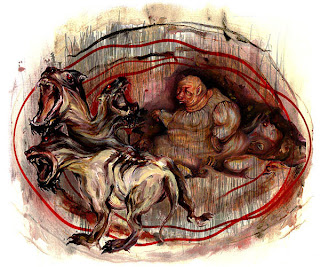Wednesday, December 8, 2010
Crime of Passion?
http://www.youtube.com/watch?v=MzgnU61a9d0
In Dante's mind fraud is a worse sin than violence. This is because fraud takes time to think over and violence is an act of passion and rage. Violence is usually sprung on very fast and one can not fully be held accountable for their actions because their state of mind is not how it usually is. Fraud is completely intentional and a person should be held responsible entirely for their actions because whatever they did they did it on purpose.
The fortune tellers are punished deeper than the violent because they tried to see the future when God never intended any human to have that capability. Fortune tellers went around knowing the future that God created for them and the only person who should know that is God and the already deceased. When Dante began to cry Virgil tells him, "Who is more arrogant/ within his soul, who is more impious/ than one who dares to sorrow at God's judgement?" (175). Virgil tells Dante he can't feel sorry for these sinners because they insulted God by telling the future that was supposed to be unknown. Also, in God's eyes these sinners are worse than the violent because they intentionally felt empowered and all-knowing by telling fortunes and only God is supposed to know this.
The violent sinners were act of rage and passion. These sins were not intentional or thought through they were heated and rash. Virgil says to Capaneus,"You are made to suffer as much fire inside/ as falls upon you. Only your own rage / could be fit to torment for your sullen pride." (130). Capaneus was violent against God. When Virgil says this he means that Capaneus' sins were out of rage and rash choices and now he must pay for them by laying in the burning sand. This sin's punishment was less severe because the state of mind of the sinners when they committed it was rash and not thought through. With fraud the sins were thought through and intentionally harm someone.
Tuesday, November 30, 2010
Archetypes of Circle 7
The sinners of circle seven, round one, were violent against their neighbors. Their punishment was to be cast in a river of boiling blood and the deeper they were the more blood thirsty they had been in life.
Archetypes of this round could be found in the river filled with boiling blood. Normally, rivers are filled with water which can represent purity. The reason Dante could not have the sinners basking in a river filled with water is because the sinners were not pure, they were vile. Dante references great leaders in history by stating, "Here they pay for their ferocity./ Here is Alexander. Here is Dionysius,/ who brought long years of grief to Sicily." (114). He talks about Alexander the Great because he killed many people in his time and he was in one of the deepest parts of the river. The sinners of this round were bloodthirsty in life and in death they must bask in the blood they spilled.
The idea that the sinners are in a river represents human life and time passing. It is very straight forward, implying that the time they spent as humans they were ignorant and murdered their neighbors. Dante openly admits their ignorance when he says, "Oh ignorant, self-seeking cupidity/ which spurs us so in the short mortal life/ and steeps us so in all eternity!" (112). Here Dante talks about how ignorant decisions from short mortal life can hurt one for all eternity. The sinners in this round were bloodthirsty and rash. The boiling aspect of the blood can mean many different things. It could represent passion or a murder out of lust, it could also represent haste or a quick decision to commit murder, or it could represent anger which would be intentionally murdering someone you were angry at. The sinners were damned in all eternity in a river filled with boiling blood, to forever absorb the blood others spilled because of them.
Tuesday, November 16, 2010
Contrapasso of Circle Three- The Gluttons
Dante makes out the sins of Circle three to be a gross and disgusting by his punishments for them and the diction he uses to describe the place the sinners are in. Gluttony was the sin committed and the sinners were basking in a place described by Dante with: "Huge hailstones, dirty water, and black snow/ pour from the dismal air to putrefy/ the putrid slush that waits for them below" (66). The repetition of the word "putrid" shows that Dante thought of the setting as symbolic of their sin, which was gross.
Gluttony was considered by Dante to be over eating or drinking. The punishments were that the sinner lay in waste, were eaten by a large dog named Cerberus, and the air was cold. All of these unpleasant effects added to the putrid idea of the sin. The contrapasso of laying in waste was that in their lifetime they produced a lot of waste and so now in Hell they will have to lay in it for eternity. The sinners ate or drank far too much in life so now Cerberus, a three-headed dog that was would eat them. Cerberus was introduced with: "Here monstrous Cerberus, the ravening beast,/howls through his triple throats like a mad dog" (66). Eating and drinking can be associated with warmth. The sinners found warmth and content from eating and drinking and then didn't know when to stop. Now in Hell they would suffer with only cold air, no longer will they have the warmth they found in life.
Overall, gluttony was made out to be a very gross sin by Dante when he used the words putrid, dirty, dismal, black, and stinking in the passage he described the setting in. Clearly Dante felt gluttony was a grimy sin that deserved a grimy punishment.
Subscribe to:
Posts (Atom)

